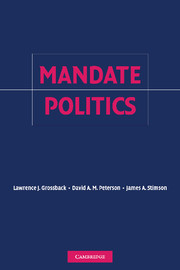Book contents
- Frontmatter
- Contents
- List of Figures
- List of Tables
- Preface
- Acknowledgments
- 1 A Single Time in a Single Place
- 2 The Evolution of Mandates
- 3 Members of Congress Respond
- 4 The Pattern of Congressional Response
- 5 Consequences
- 6 The Irresistible Meets the Unmovable
- 7 Conclusion: A Mandate View of Normal American Politics
- Bibliography
- Index
7 - Conclusion: A Mandate View of Normal American Politics
Published online by Cambridge University Press: 14 August 2009
- Frontmatter
- Contents
- List of Figures
- List of Tables
- Preface
- Acknowledgments
- 1 A Single Time in a Single Place
- 2 The Evolution of Mandates
- 3 Members of Congress Respond
- 4 The Pattern of Congressional Response
- 5 Consequences
- 6 The Irresistible Meets the Unmovable
- 7 Conclusion: A Mandate View of Normal American Politics
- Bibliography
- Index
Summary
…You asked, do I feel free. Let me put it to you this way: I earned capital in the campaign, political capital, and now I intend to spend it.
(President George W. Bush, Nov. 4, 2004, Post-Election News Conference)Presidential elections in America always carry some suspense. Even when the outcome is pretty well foretold and the evening is just going to confirm confident prognostications, presidential elections are history-making events, their importance clear to all while they are going on.
THE 2004 MANDATE?
So it was on November 2, 2004. George W. Bush, seeking a second term in the White House, was leading in most of the polls. But the lead was not large and two polling organizations actually had Bush's opponent, John Kerry, ahead. So there was plenty of suspense on the election night telecasts.
As the evening wore on Bush captured Florida – the site of the bitter 2000 recount – and by a margin larger than expected. And, with results coming in more slowly, he pulled out to a lead in Ohio, a lead that ultimately held up through confusion and controversy. The rest of the nation was so predictable that it was clear to electoral vote counters, amateur and professional alike, that Ohio was the game and that winning it was winning reelection.
- Type
- Chapter
- Information
- Mandate Politics , pp. 179 - 194Publisher: Cambridge University PressPrint publication year: 2006



